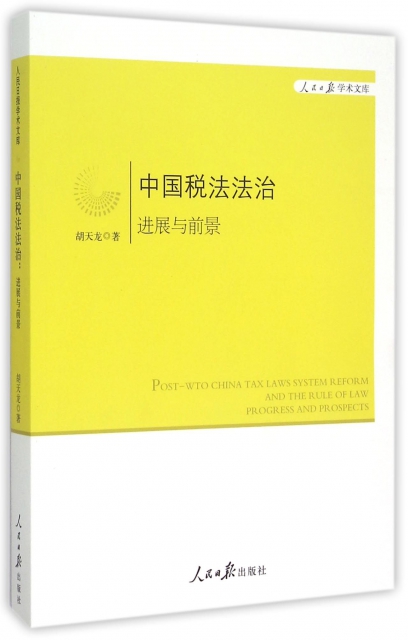| | | | 中國稅法法治(進展與前景)(英文版)/人民日報學術文庫 | | 該商品所屬分類:法律 -> 法律普及讀物 | | 【市場價】 | 536-776元 | | 【優惠價】 | 335-485元 | | 【介質】 | book | | 【ISBN】 | 9787511532299 | | 【折扣說明】 | 一次購物滿999元台幣免運費+贈品
一次購物滿2000元台幣95折+免運費+贈品
一次購物滿3000元台幣92折+免運費+贈品
一次購物滿4000元台幣88折+免運費+贈品
| | 【本期贈品】 | ①優質無紡布環保袋,做工棒!②品牌簽字筆 ③品牌手帕紙巾
|
|
| 版本 | 正版全新電子版PDF檔 | | 您已选择: | 正版全新 | 溫馨提示:如果有多種選項,請先選擇再點擊加入購物車。*. 電子圖書價格是0.69折,例如了得網價格是100元,電子書pdf的價格則是69元。
*. 購買電子書不支持貨到付款,購買時選擇atm或者超商、PayPal付款。付款後1-24小時內通過郵件傳輸給您。
*. 如果收到的電子書不滿意,可以聯絡我們退款。謝謝。 | | | |
| | 內容介紹 | |

-
出版社:人民日報
-
ISBN:9787511532299
-
作者:胡天龍
-
頁數:325
-
出版日期:2015-06-01
-
印刷日期:2015-06-01
-
包裝:平裝
-
開本:16開
-
版次:1
-
印次:1
-
字數:396千字
-
國際稅收合作和競爭以及各國稅收制度趨同在高
速發展的全球化時代是明顯且富有爭議性的,尤其是
在全球大多數國家已經逐漸放松了對資本和勞務流動
性的限制的背景下。中國在加入世界貿易組織後,在
稅收法律制度改革方面取得了長足進步,在立法、執
法、司法和非政府組織稅制建設中均取得了驕人成果
,胡天龍著的《中國稅法法治(進展與前景)(英文版)
》正是基於國際稅收競爭和合作的背景,對中國入世
以來的稅收法律制度進行觀察和詳細梳理,為將來的
發展和改革方向提出建議。
-
Chapter I Introduction
I.Background
II.Purpose
III.Limits and Assumptions
IV.Data Analysis
V.Outline and Synopsis
Chapter II An Overview of the Chinese Tax Law System
I.Introduction
II.Historical Development of the PRC Tax Laws
2.1.Pre.1978
2.2.The Economic Reform Period 1978—1992
2.3.1994 Tax Reform
2.4.P0st—WT0 Accession
III.Framework of the Chinese Tax System
3.1.Sources of the Chinese Tax Laws
3.2.Basic Factors Affecting China's Tax Law System in General
IV.Policy Considerations and the Reform of the Tax Law
4.1.A Capitalist Profit Motive 9
4.2.Economic Efficiency and Tax Equity
V.China's Tax Law Reform and Fiscal Decentralization
5.1.Overiew 73
5.2.Overview of Fiscal Decentralization
5.3.Impact of Fiscal Decentralization
5.4.Challenges raised by fiscal decentralization
5.5.Summary
VI.Conclusion
Chapter 111 The Rule of Law and Legal Reform in China
I.Introduction
II.The Western Rule of Law Rhetoric 103
2.1.The Contested Definition--Instrumental VS.Substantive
2.2.Rule of Law in Positivism and Natural LaW
2.3.“Thin VS.thick”categorization—an over—asserted dichotomy
2.4.The Rule of Law·Development Rhetoric
2.5.Summary
III.The Establishment of the Socialist Rule of Law with Chinese
Characteristics
3.1.Socialist Legal Theorems
3.2.Development of Socialist rule of law
3.3.Summary
IV.The Implication of Rule of Law Conception to Contemporary China
4.1.Legal Reform in the Past Three Decades
4.2.Rule of Law VS.Rule by law
4.3.Reviewing China's legal system
4.4.Summary
V.Prospects and Implications for China'S Socialist Rule of Law
5.1.Is There a Necessity to Locate a Rule of Law Model for China?
5.2.Prospects for Chinese Legal Reform
VI.Summary
Chapter IV WTO Accession and its Implications for the Rule of
Law Reform in China
I.Introduction l 32
II.Overview of China's WTO Commitments
III.Impact of WTO Accession on the China's Legal System
3.1.Market Economy
3.2.Dispute Settlement and China's WTO capacity building
3.3.Foreign Investment Law
3.4.Trade Law Regime
3.5.WTO's Normative Impacts
3.6.Judicial Review
IV.The Impact of WTO Accession on Rule of Law Development in China
Chapter V WTO and China's Tax Law Reform-Tax Legislation
I.Introduction
II.Overview of WTO Principles Affecting the Tax Laws System
2.1.The non·discrimination Principle
2.2.Principle against Expoa Subsidies
2.3.The dispute settlement process under the WTO
III.Overview of the impacts of WTO Principles on China's tax laws system
3.1.The binding effects of WTO agreements on the tax law system
3.2.Implication of the WTO agreements to China's tax laws reform in
General
3.3.WTO's impacts Off the Chinese tax law system—a normative
perspective
3.4.Implications for the Tax Administration System
3.5.Summary
IV.Implications to the tax legislation reform-a formal perspective
4.1.Implications for the turnover tax system
4.2.Implications for Enterprise Income Tax
4.3.Individual income tax(IIT)
4.4.Case analysis—WTO Constraints on China's Tax Law Refornl
4.5.Limitations of the WTO's Constraints
4.6.Summary
V.Conclusion-Tax Incentive Policies under the WTO Regime
Chapter VI Tax Judicature System Reform.an Identity Loss
I.Introduction
II.Rationales for structuring the tax judicature system
2.1.The application of basic principles of administrative law
2.2.Judicial review and the rule of law
2.3.Development of a market economy
2.4.Pressure from the tax legislation reform
2.5.Taxpayers’rights protection awareness
2.6.A catch.up to international routines
2.7.Summary
III.Takeaways from the U.S.experience
3.1.The evolution of the U.S.Tax Court system
3.2.Considerations for structuring a tax court system
IV.A triple whammy-prospects of Chinese tax judicature reform
4.1.A system full of peculiarities
4.2.An interesting debate—the Chinese tax court
4.3.A legitimate need of tax administration
4.4.Judicial review through the lens of tax judicature
4.5.The Taxpayers’interests perspective
4.6.Summary
V.Submission of proposals for China's tax judicature reform
5.1.Two Prongs of tax judicature reform
5.2.Repudiation of the full—payment rule
5.3.Summary judgment for small tax cases
5.4.Cautious restructuring of the tax administrative reconsideration
5.5.Building up tax expertise
5.6.Subject general administrative actions to judicial review
5.7.Tax Court
5.8.Summary
VI.Conclusion
Chapter VII Tax Treatment of Nonprofit Organizations-A Comparative
Study
I.Introduction
II.Overview and Background of Nonprofit Sector Laws in China
2.1.Historical Development
2.2.Summary of Current Laws and Regulations in China
2 3 Tax treatment 0f Chinese NGOS
III.Current U.S.Federal NGO Tax Exemption System——An Institutionaland
Theoretical Analysis
3.1.The Exemption
3.2.Theories of Charitable Exemption
3.3.Overview of Financial Incentives in the NGO Sector
IV.The Charitable Tax—exemption System in Practice——a Further
Comparison
4.1.Formation and Registration
4.2.Recognized Exempt Purpose and Definition of Charity
4.3.Requirement of Operation for an Exempt Purpose
4.4.Prohibition of Private Inurement
4.5.NGO Asset Management upon Dissolution,Termination and
Liquidation
4.6.Tax Culture
V.Conclusion
Chapter VIII Summary and Conclusion
| | |
| | | | |
|




